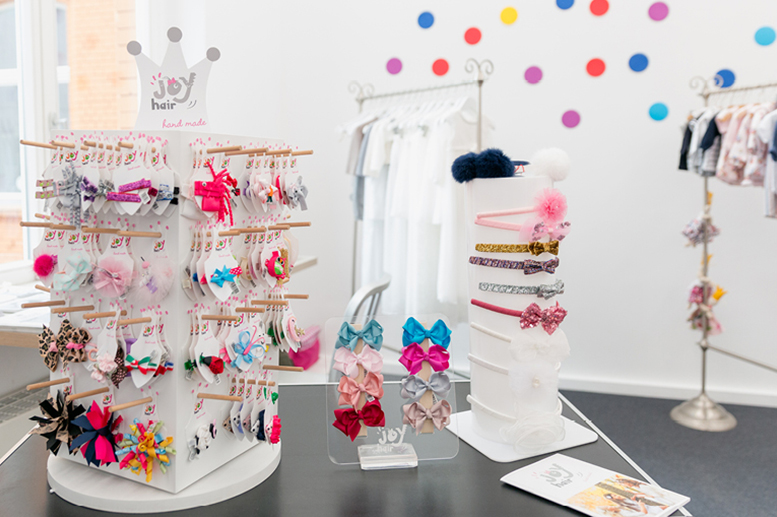
The retail agency for uniqueness
Bettina Ramin has been a retail agent for ten years. Among other things, she represents well-known brands such as Jottum, Storksak, Babymel, and Anna + Paul. Luna Journal met the retail agent during the Press Days at the Cookies Showroom. In an interview, she reveals what a brand is all about.
Luna Journal: You’ve come from Bavaria to the Cookies Showroom for the Press Days. How did you find the two days and what will you be taking from them?
Bettina Ramin: The two days here in Berlin were very exciting for me. I was able to really get to grips with the topic of social media. Usually, I don’t address it that much due to a lack of time. You pick up on something here and there about bloggers, but I was not so aware of how things work in terms of the big picture. I like to observe the developments in social media, but I’m not 100% an expert on bloggers and all of that. At the Press Days in the Cookie Showroom, I had the opportunity to learn more about it and to get to know the background better. And it’s important to stay up to date.
What criteria does a brand need to fulfil to be accepted by your retail agency?
First and foremost, I have to like the brand. When choosing brands, I look for unique and special products. Above all, I am looking for niche products that catch the eye. That’s where I’ve focussed my agency. One example is Joyhair, which makes children’s jewellery by hand. Although I receive a lot of offers, most products lack that extraordinary something for me. Therefore, I usually discover my brands myself.
What is your approach to client acquisition?
To start with, I want to know which manufacturers the retailers are working with and the price level of their products. Then, I will think about whether my brands would suit the store. If the store’s goods are only represented in the low-price segment and the retailer wants to sell a high-end brand like Jottum, then it’s not a good fit. In such cases, I refrain from working together because, in the end, the brand will only suffer. In contrast, if I think that a product absolutely belongs in a particular shop and I want to make sure it gets there, then I will stay on the ball until I get a “yes” or “no”. I can be very stubborn in this regard. Ultimately, I want my brands to have a beautiful positioning in the shops.
To what extent can you influence the development of one of your brands?
After every sales season, we have an after-sales meeting. There, we discuss what went well and what went less well. I give suggestions for improvement. Sometimes my suppliers follow these suggestions and sometimes they don’t. It is entirely up to them what they do with my advice.
Foreign labels need retail agencies to get their goods into the German market. What role do you play as a retail agent?
Often, the German customer cannot communicate with the foreign manufacturer, so a German contact person is needed. This is where I come into play. Agents will get involved for queries, emerging problems, or when there are communication difficulties between the manufacturer and the brand. Nowadays it is often said that we are no longer needed. I don’t see it that way. Agents are particularly important when selling foreign brands. There are customers who will only take the product if there is a brand representative. German trade representatives are familiar with the local market and are experts when it comes to supporting foreign brands.
Is there a recipe for success when it comes to establishing a young brand on the market?
We have an oversupply in the children’s sector everywhere in Germany. It is therefore a matter of highlighting the brand’s distinctiveness. I find that small brands with a smaller offer can be better established in the market compared to collections with more than 300 items. For example, my brand Silkweave has 20 pieces per collection and Merci Marie has 30-35 pieces per collection. This is a manageable product range and at the same time easily tradable.
It is important that I can travel with the small collections. I often do that with my accessory companies especially, so I can introduce and present the product on site. These personal visits, in particular, promote the development of a brand. Compared to a trade fair visit, more time can be invested in the sales talk. At a trade fair, you are also only one of many. In my experience, direct customer contact is very important for the placement of a brand.

Bettina Ramin
How important are marketing measures at the POS (point of sale)?
I think marketing measures are very important, but it’s not my area of expertise. Nevertheless, I give tips on brand presentation. Personally, I sometimes find that the salespeople lack a certain passion and competence. That is why I also advise that sales training is provided for the staff. The in-store customer has become more demanding. Often, the staff have not adjusted to this. Previously, you had your permanent customer advisor, who knew almost every customer. That is unfortunately no longer the case. So the thing that makes bricks-and-mortar shopping unique, compared to online shopping, is being lost. Retailers should make the most of this advantage. The customers value the personal sales talk. This makes in-store shopping a unique experience.
How are you dealing with digitalisation as a retail agency?
Digitalisation is simply progress. I work with my possibilities in this area and I am adapting to digitalisation as well as possible. This is progress, you can’t stop it. Cars are also getting faster and driving themselves. The Internet is also part of progress. However, I don’t see any drawbacks. Quite the opposite. I advise people to move with the times, because inertia is death.
Image: Andrej Dallmann
//JP



Leave a Reply
Be the First to Comment!